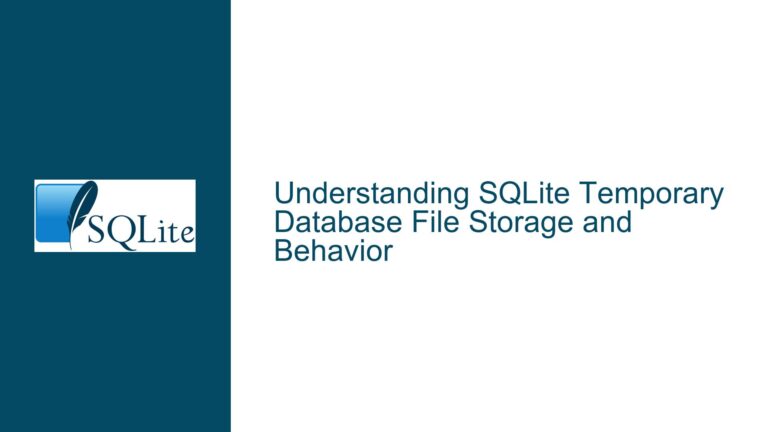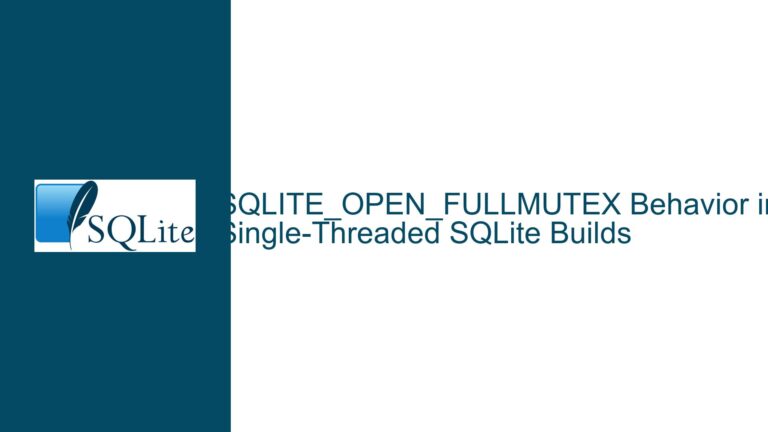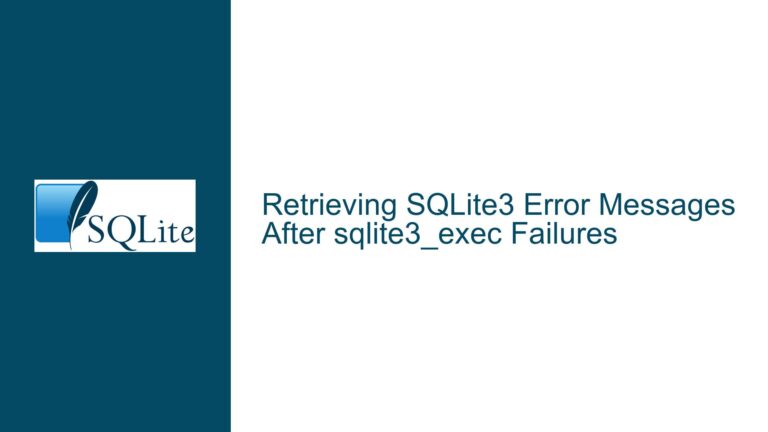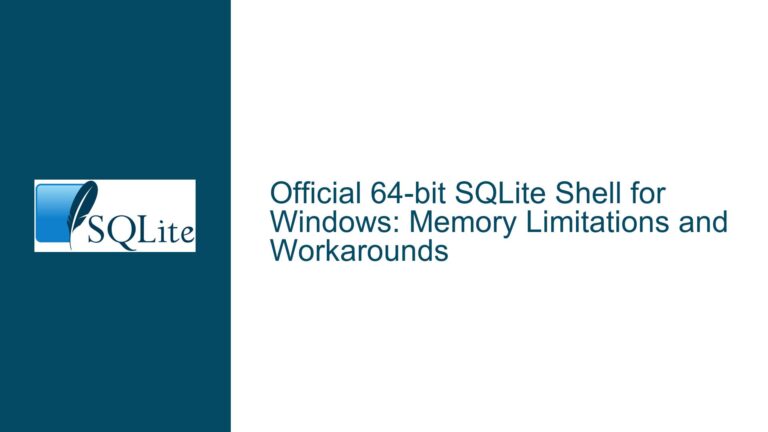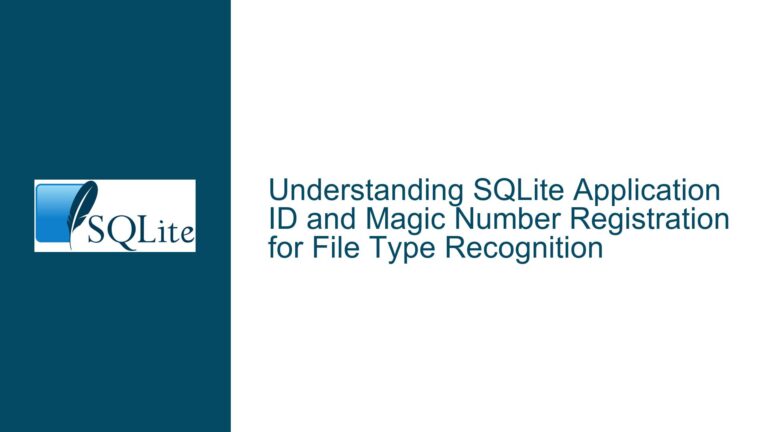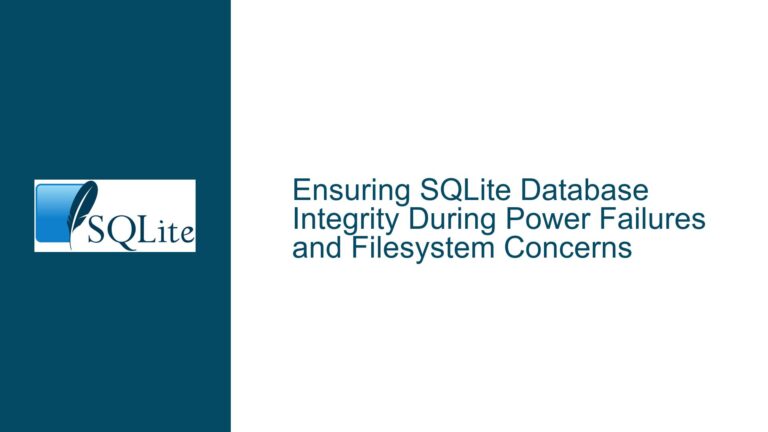Building with SQLITE_OMIT_WAL Causes Multiple Test Failures
Understanding the Impact of Compiling SQLite Without Write-Ahead Logging (WAL) Support
The decision to compile SQLite with the -DSQLITE_OMIT_WAL flag introduces significant behavioral changes to the database engine, particularly in how transactions and concurrency are managed. This flag disables the Write-Ahead Logging (WAL) journal mode, a core feature that decouples read and write operations for improved concurrency. While SQLite’s test suite includes logic to skip WAL-specific tests when WAL is omitted, the observed failures across 20+ test files (e.g., e_walckpt.test, nolock.test, sync2.test, exclusive.test) indicate systemic issues arising from the absence of WAL. These failures are not isolated to tests explicitly targeting WAL functionality but also affect components that indirectly depend on WAL’s transactional guarantees, locking mechanisms, or recovery processes. The disconnect between the expectation of skipped WAL tests and the actual test results suggests deeper integration of WAL into SQLite’s operational logic than surface-level conditional test skips might account for.
The problem manifests across macOS and Linux (Fedora), confirming platform-agnostic behavior. The test failures include low-level pager operations (pager1.test), exclusive locking (unixexcl.test), database recovery (recovercorrupt2.test), and file system interactions (symlink.test), indicating that WAL’s absence disrupts both high-level transactional workflows and foundational I/O operations. This raises critical questions about how SQLITE_OMIT_* flags interact with the codebase’s assumptions and the test suite’s ability to dynamically adapt to omitted features. The failures also highlight the risks of using unsupported compile-time options, as emphasized in SQLite’s official documentation, which explicitly warns against relying on SQLITE_OMIT_* for production configurations due to their untested and unstable nature.
Why Disabling WAL Breaks More Than Just Explicit WAL Tests
The root cause of these test failures lies in the architectural dependencies SQLite has on WAL, even when the feature is omitted. While the test suite attempts to skip WAL-specific tests using conditional checks (e.g., capabilities wal), many tests assume the presence of WAL’s transactional semantics or interact with subsystems that are tightly coupled with WAL. For example, exclusive.test and nolock.test validate locking behaviors that differ fundamentally between WAL and non-WAL modes. When WAL is omitted, SQLite defaults to rollback journal mode, which uses stricter locking protocols. However, the test suite may not fully account for these behavioral differences, leading to false negatives.
Another critical factor is the compile-time removal of WAL-related code, which creates "gaps" in the codebase that other subsystems may implicitly rely on. For instance, the sqlite3PagerOpenWal function, responsible for initializing WAL connections, is conditionally compiled out when SQLITE_OMIT_WAL is defined. This creates undefined symbol errors in code paths that reference this function, even if those code paths are theoretically unreachable in non-WAL mode. Such omissions destabilize the internal consistency of the database engine, causing unexpected crashes or assertion failures in tests that do not directly exercise WAL features.
Additionally, the SQLITE_OMIT_* flags are not rigorously tested by the SQLite development team, as noted in the documentation. This means that code paths involving omitted features may harbor latent assumptions about the availability of WAL-specific structures (e.g., the WAL index, checkpointing threads). For example, sync2.test and walseh1.test involve synchronization primitives that are optimized for WAL mode. Without WAL, these tests may execute code paths that are no longer valid, leading to race conditions or incorrect state management.
Resolving Test Failures When WAL Is Omitted: Strategies and Workarounds
1. Avoid Using SQLITE_OMIT_WAL Entirely
The most reliable solution is to refrain from using -DSQLITE_OMIT_WAL. Instead, disable WAL at runtime by setting PRAGMA journal_mode=DELETE; or configuring the database connection to use rollback journal mode. This ensures all WAL-related code remains present but unused, preserving the integrity of internal subsystems that may indirectly depend on WAL functions. Runtime disabling avoids the destabilizing effects of compile-time code removal and aligns with SQLite’s supported use cases.
2. Patch the Test Suite to Handle WAL Omission Gracefully
If omitting WAL is non-negotiable, modify the test suite to explicitly skip or adapt tests that fail due to WAL’s absence. For example, in testrunner.tcl, enhance the capabilities check to not only skip WAL-specific tests but also adjust assertions in tests that assume WAL’s presence. This requires deep analysis of each failing test to determine whether it can be conditioned on capabilities wal or needs behavioral adjustments for rollback journal mode. For instance, corruptL.test involves WAL-specific corruption scenarios; these tests should be skipped entirely. Conversely, busy2.test may need revised locking expectations when WAL is disabled.
3. Use a Custom Build with Stubbed WAL Functions
For advanced users, create a compile-time stub implementation of critical WAL functions (e.g., sqlite3WalBeginReadTransaction, sqlite3WalCheckpoint) that return SQLITE_ERROR or SQLITE_NOT_SUPPORTED. This approach retains function symbols in the binary, preventing linker errors, while explicitly disabling WAL functionality. This is safer than outright code omission because it maintains API consistency. However, this requires meticulous auditing of all WAL-related calls to ensure they handle error codes correctly.
4. Leverage SQLITE_OMIT_WAL Alternatives
Instead of omitting WAL, use SQLITE_DEFAULT_JOURNAL_MODE=DELETE in the compile-time configuration. This forces the default journal mode to rollback without removing WAL code. Combined with SQLITE_OMIT_AUTOMATIC_INDEX and SQLITE_OMIT_SHARED_CACHE, this can approximate a minimal build while retaining internal code paths that depend on WAL’s existence.
5. Validate Compilation with Sanitizers and Assertions
Enable SQLite’s internal sanity checks (-DSQLITE_DEBUG) and instrumentation (e.g., AddressSanitizer, UndefinedBehaviorSanitizer) to identify crashes or undefined behavior caused by WAL omission. For example, the sqlite3PagerWalSupported function returns false when WAL is omitted, but callers like pagerOpenWal may still be invoked, leading to null pointer dereferences. Sanitizers help pinpoint these issues, enabling targeted fixes or test exclusions.
6. Consult SQLite’s Unsupported Features Documentation
Recognize that SQLITE_OMIT_* flags are unsupported and subject to change between releases. The test failures observed in version 3.46.0 may differ in future versions, as the SQLite team does not guarantee backward compatibility for omitted features. If WAL omission is critical, consider maintaining a patched fork of SQLite with backported fixes for test suite compatibility.
Final Recommendations
The recurring theme across all solutions is that SQLITE_OMIT_WAL introduces unquantifiable risk due to its unsupported status. For production systems, runtime configuration (e.g., PRAGMA journal_mode) is vastly preferable. Developers requiring a minimal SQLite build should use officially supported compile-time options like SQLITE_OMIT_JSON or SQLITE_OMIT_LOAD_EXTENSION instead of targeting core transactional subsystems. When WAL omission is unavoidable, extensive test suite modifications and runtime validation are necessary to mitigate instability.

